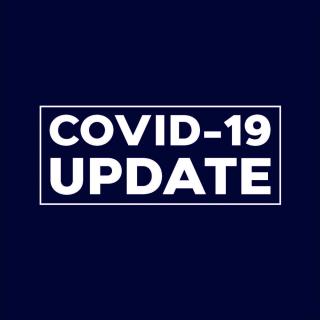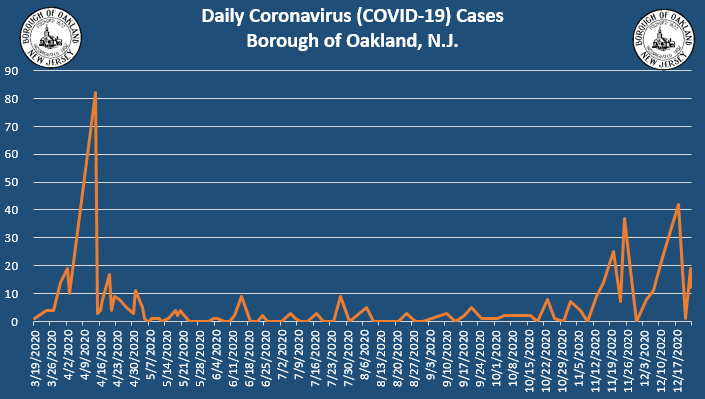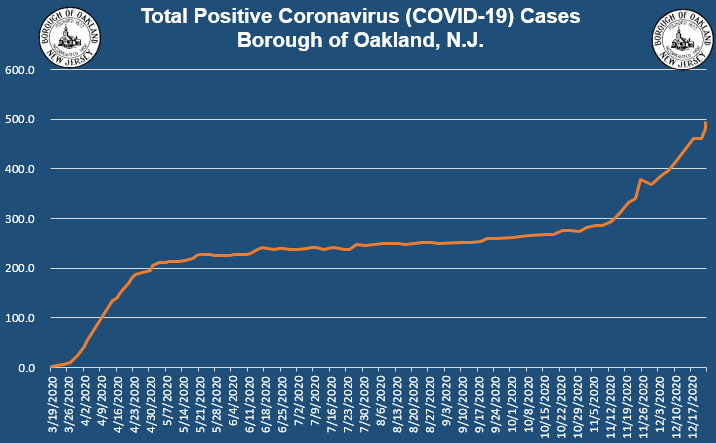Coronavirus (COVID-19) Update 12/28/2020

2021 Borough Calendar/Garbage and Recycling Information:
Residents should start receiving the 2021 Borough Calendar in the mail starting on Saturday January 2, 2021 through January 4, 2021. Please be advised that the Calendar and Recycling Newsletter have been combined into one (1) publication for 2021. Extra copies will be made available in the Borough Clerk’s Office starting next week. The Borough Calendar will also be made available on the Borough Website as a PDF document for viewing.
Bergen County Announces COVID-19 Vaccination Program Eligibility for Healthcare Workers:
Under CDC and State health guidelines, the Moderna doses will serve Bergen County category 1A healthcare workers who have not been vaccinated for COVID-19 through their employer or the federal Pharmacy Partnership for Long Term Care (LTC) Program administered through CVS and Walgreens. Eligible category 1A healthcare workers must live in Bergen County or work in a Bergen County category 1A healthcare facility.
The County will administer the Moderna COVID-19 vaccinations at the Bergen New Bridge Medical Center campus, Annex Alternate Care Facility located at 230 East Ridgewood Avenue, Paramus, NJ 07652. The Annex has the capacity to handle over 300 vaccinations per day, which qualifies as a “large” Point of Dispensing (POD) location for the State of New Jersey. Bergen New Bridge Medical Center recently received designation from the New Jersey State Department of Health as one of the first Moderna vaccine “initial distribution points.”
Eligible category 1A healthcare workers may register for a Moderna COVID-19 vaccine appointment at www.BergenCOVIDVaccine.com. Professional license, employer ID or a paystub showing employment by a category 1A healthcare facility must be Moderna Vaccine presented on arrival. Appointments will be at offered at varying times including weekends to accommodate the schedules of category 1A healthcare workers.
Category 1A healthcare workers include any paid or unpaid person working or volunteering in a “healthcare setting” who may have direct or indirect contact with infectious persons or materials. Classification for category 1A healthcare workers include doctors, nurses, pharmacists, dentists, any other licensed or registered health professionals, staff in areas of facility management, security, food services, environmental services, administrative services, human resources, reception, language services, information technology, laboratory, other support areas, community health workers/promoters, doulas, health educators, public health professionals, trainees, students, volunteers, essential caregivers, vaccinating site staff, contractors, emergency medical services (EMS), paramedics, funeral staff, mortuary staff, and autopsy workers.
COVID-19 vaccines will continue to be rolled out in phases and the County of Bergen in partnership with Bergen New Bridge Medical Center will continue to work closely with federal, state, and local partners. The County and Bergen New Bridge anticipate the Annex Alternate Care Facility will be able to accommodate the 1B category of essential workers before moving to the 1C category of adults 65+ with high-risk medical conditions. Bergen County will receive notification from the NJ Department of health upon moving from category 1A to category 1B.
Category 1A healthcare workers can register at www.BergenCOVIDvaccine.com .
Bergen County Mobile COVID-19 Testing:
Bergen County’s third week of COVID-19 drive-thru testing at Bergen Community College (400 Paramus Road, Paramus - Lot A) begins tomorrow! This test site will offer COVID-19 Nasal Swab Antigen tests, which allows for rapid results in just 24 hours. Testing is available to all County residents free of charge, regardless of health insurance status.
Residents must schedule their test through an online portal at www.research.net/r/AntigenBCCC.
Pre-registration is required. No walk-ins are permitted.
- December 29, 2020 from 9:00 a.m. – 2:30 p.m.
- December 30, 2020 from 9:00 a.m. - 2:30 p.m.
Please remember to bring a form of identification, proof of Bergen County residency, and insurance card if applicable.
It is important to continue practicing cautionary measures including wearing a mask when going out, keeping social circles small, and getting tested, especially if you have been exposed to larger group settings.
N.J. Health Department Announces Mega Sites As Part of Overall Statewide COVID-19 Vaccine Planning Effort:
Six mega sites throughout New Jersey will serve as vaccination hubs for phased priority groups, part of a critical network of over 200 sites tasked with carrying out the state’s COVID-19 vaccination plan fairly and equitably, the New Jersey Department of Health (NJDOH) has announced.
The six state-coordinated sites are expected to begin opening in early January and will immediately be in position to vaccinate front-line healthcare workers and then continue in a phased approach depending on the supply of vaccine to New Jersey. After these phases are complete, then the general public will be eligible for vaccination. The timing of the progression among the groups depends on the supply of vaccine to the state.
The sites include:
- Atlantic County: Atlantic City Convention Center
- Bergen County: Racetrack at Meadowlands, East Rutherford
- Burlington County: Moorestown Mall
- Gloucester County: Rowan College of South Jersey, Sewell
- Middlesex County: New Jersey Convention and Exposition Center, Edison
- Morris County: Rockaway Townsquare
Vaccinations began last week in New Jersey hospitals for paid and unpaid persons serving in their health facilities. Vaccinations of long-term care residents and staff have begun through the federal Pharmacy Partnership for Long-Term Care Program with Walgreens and CVS.
The goal is to vaccinate up to 2,400 people per day through the mega sites. The mega sites are one of several types of sites - including micro, medium and large - that will be utilized in the COVID-19 vaccination plan, classified by the number of people that can be vaccinated per day.
These community-based sites are being established in various settings and locations throughout the state. The sites also will include: county sites, and county and local health departments; urgent care centers; the federally qualified health centers; select retail pharmacies; and primary care providers as the state moves through the vaccination phases and toward availability to the general public. Additional sites will be added as the phases progress.
The Health Department will announce an online portal to enable the various groups in the initial phases and eventually the general public to find a vaccination site and register and schedule an appointment. Some vaccination sites may offer walk-up/on-site registration as well.
The Department is also finalizing a public dashboard which will show doses administered and some demographic information. Data will be updated weekly and refined over time.
The mega sites are a collaborative partnership with the NJDOH, New Jersey All-Hazards Incident Management Team (NJ-AHIMT), New Jersey Office of Emergency Management, healthcare providers, local/county health officials, local/county health departments and local/county emergency management.
How the Newly Signed COVID-19 Relief Bill Affects Businesses and Families in NJ:
Source: NJ Business Action Center/Melanie Willoughby, Executive Director, NJBAC
Updated December 28, 2020
President Donald J. Trump signed into law the Coronavirus Relief Package yesterday, December 27, 2020. Here is a summary of the funding package and how it affects NJ families and small businesses. There is a further vote pending later today in the United States Congress and Senate to increase the direct payments to residents to $2,000.00 per person.
Direct Stimulus Payments:
The $600 checks directed by the relief bill would represent half of the $1,200 directed toward most adults in the first round of stimulus checks.
Single people earning up to $75,000 would receive $600, while married couples earning up to $150,000 would receive $1,200.
The second round of checks would have the same type of income phase outs as in the CARES Act, with the stimulus check payments reduced for earnings above $75,000 per single person or $150,000 per married couple.
The second stimulus checks would be phased out entirely for single people earning over $87,000 or married couples earning more than $174,000 — compared with the CARES Act's phase out for single people earning over $99,000 and for couples earning over $198,000.
There is currently no official timeframe for delivery of stimulus payments.
To check on how much you might receive, you can go to Omni Calculator's second stimulus calculator for an estimate.
Small Business - $325 Billion:
This bill includes $284 billion for the Paycheck Protection Program (PPP) and extends PPP through March 31, 2021. Changes to PPP include:
- Provides a second PPP forgivable loan for the hardest-hit small businesses and non- profits with 300 or fewer employees and that can demonstrate a loss of 25% of gross receipts in any quarter during 2020 when compared to the same quarter in 2019;
- Creates a dedicated $15 billion set-aside for lending through community financial institutions, including Community Development Financial Institutions and Minority Depository Institutions to increase access for minority-owned and other underserved small businesses and nonprofits;
- Creates a set-aside for very small businesses with 10 or fewer employees and for small businesses located in distressed areas;
- Expands PPP eligibility for more critical access hospitals, local newspapers and TV and radio broadcasters, housing cooperatives, and 501(c)(6) nonprofits, including tourism promotion organizations and local chambers of commerce;
- Allows for small businesses in the restaurant and hospitality industries to receive larger awards of 3.5 times average total monthly payroll, rather than 2.5 times;
- Adds PPE expenses, costs associated with outdoor dining, and supplier costs as eligible and forgivable expenses;
- Simplifies the forgiveness process for loans of $150,000 and less;
- Repeals the requirement of deducting an EIDL Advance from the PPP forgiveness amount.
EIDL Grant Program - $20 Billion:
This bill includes $20 billion for EIDL Advance grants. Small businesses and nonprofits in low- income communities are eligible to receive $10,000 grants. Any small businesses and nonprofits in low-income communities that received an EIDL Advance previously are also eligible to receive the full $10,000 if their award was less in the first round of grants.
Grants for Shuttered Venue Operators - $15 Billion:
The bill provides $15 billion for SBA grants up to $10 million to live venues, independent movie theaters, and cultural institutions to address the economic effects of the pandemic. Grants can be used to cover expenses such as payroll costs, rent, utilities, and personal protective equipment. Two priority periods are established to ensure the hardest hit entities have dedicated access to assistance for the first 28 days of the program, while a reserve fund is made available ensure entities that are ineligible for the priority periods are able to receive assistance following the two 14-day priority periods. A set-aside of $2 billion is also reserved for entities with 50 or fewer employees. The program is authorized to make supplemental grants equal to 50 percent of the initial grant.
Extended SBA Debt Relief Payments - $3.5 Billion:
This bill provides $3.5 billion to resume debt relief payments of principal and interest (P&I) on small business loans guaranteed by the SBA under the 7(a), 504 and microloan programs. All borrowers with qualifying loans approved by the SBA prior to the CARES Act will receive an additional three months of P&I, starting in February 2021. Going forward, those payments will be capped at $9,000 per borrower per month. After the three-month period described above, borrowers considered to be underserved—namely the smallest or hardest-hit by the pandemic— will receive an additional five months of P&I payments, also capped at $9,000 per borrower per month. SBA payments of P&I on the first 6 months of newly approved loans will resume for all loans approved between February 1 and September 30, 2021, also capped at $9,000 per month.
Enhancements of SBA Lending Programs - $2 Billion:
This bill provides $2 billion to enhance SBA’s core programs, including 7(a), Community Advantage, 504, and the Microloan program, by making them more affordable and useful to small businesses. It also provides $57 million for the SBA Microloan Program to provide technical assistance and leverage about $64 million in microloans for minority-owned and other underserved small businesses.
The following links provide updates to policies and guidelines, safety recommendations, and business resources.
Quick Resources:
- New Jersey Business Portal - NEW
- New Jersey Executive Orders
- Reopening Timelines & Guidance
- NJ Department of Health COVID-19 Administrative Orders
- NJ State Business Resources for COVID-19
- NJ State General Resources for COVID-19
- NJ Department of Labor Return to Work Resources
- NJ Economic Development Authority Assistance Programs
- NJ State Jobs & Hiring Portal
- NJ Department of Labor Employer & Employee Leave Benefits
- NJ PPE Supplier Registry
- NJ Business Action Center Services for Business Reopening. Businesses can also call 800-JERSEY-7.
- NJ 24-Hour COVID-19 Health Hotline: 800-222-1222
Federal Resources:
- OSHA Guidance on Preparing Workplaces for COVID-19
- CDC Guidance on Returning to Work
- SBA Paycheck Protection Program
- SBA Economic Injury Disaster Loan Emergency Advance
- U.S. Department of Labor Paid Sick Leave Qualifications
- Guidance on Workplace Leave
- SBA Hotline: 800-659-2955
Additional Resources:
- NJ Chamber of Commerce COVID-19 Resources
- NJ Business & Industry Association COVID-19 Resources
- New Jersey Small Business Development Centers
Coronavirus Positive Tests in Oakland:
The Borough of Oakland has been notified by the Bergen County Department of Health that there are 12 new positive cases of COVID-19 reported in Oakland, bringing our to-date total to 493 cases. The Borough of Franklin Lakes reported 16 new positive cases of COVID-19, bringing their to-date total to 510 cases. The Township of Wyckoff reported 19 new positive cases of COVID-19, bringing their to-date total to 781 cases. The Bergen County Department of Health has reported 1,524 new positive cases of COVID-19, bringing the County-wide to-date total to 45,035 cases. Governor Murphy has reported that there was 2,745 new positive COVID-19 cases reported today, bringing the state-wide New Jersey total to 465,965 cases.
If anyone has questions about COVID-19, you can call the 24-hour New Jersey Hotline at (800) 222-1222. You can also visit the State of NJ Coronavirus Website Here.
Important Resources:
- The latest data on coronavirus infections in New Jersey are available on the New Jersey COVID-19 Dashboard. The dashboard has been updated to provide more information on scope of the virus and hospitalizations, including the number of patients hospitalized, discharged, in critical care, in intensive care, and on ventilators, along with data on statewide ventilator capacity, numbers of positive/negative tests, and more.
- New Jersey’s COVID-19 Information Hub includes valuable resources and information for families, workers, and employers who have questions or needs arising from the current crisis.
- Testing Sites: To locate a testing location, specifics on how to get a test, and the hours of operation, click here.
- Information for businesses impacted by COVID-19.



